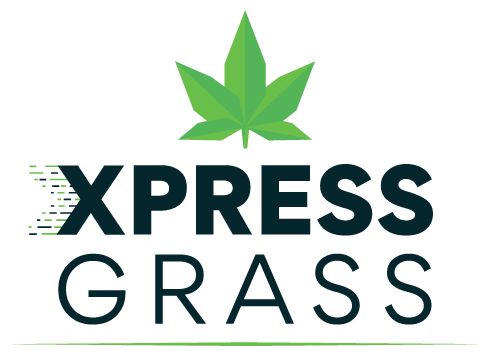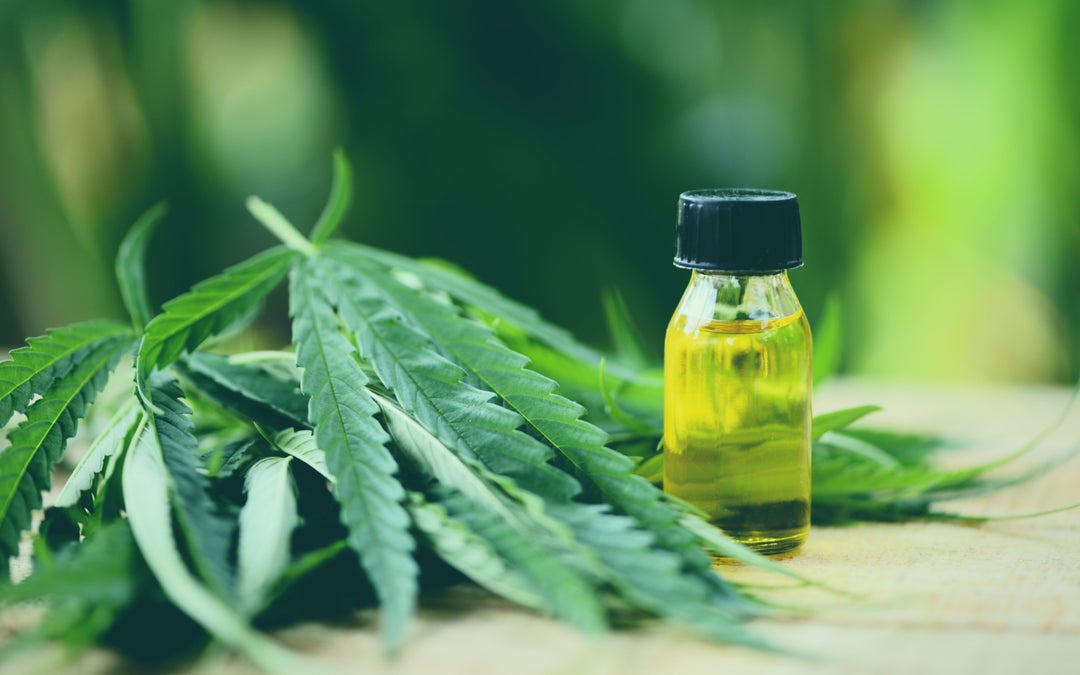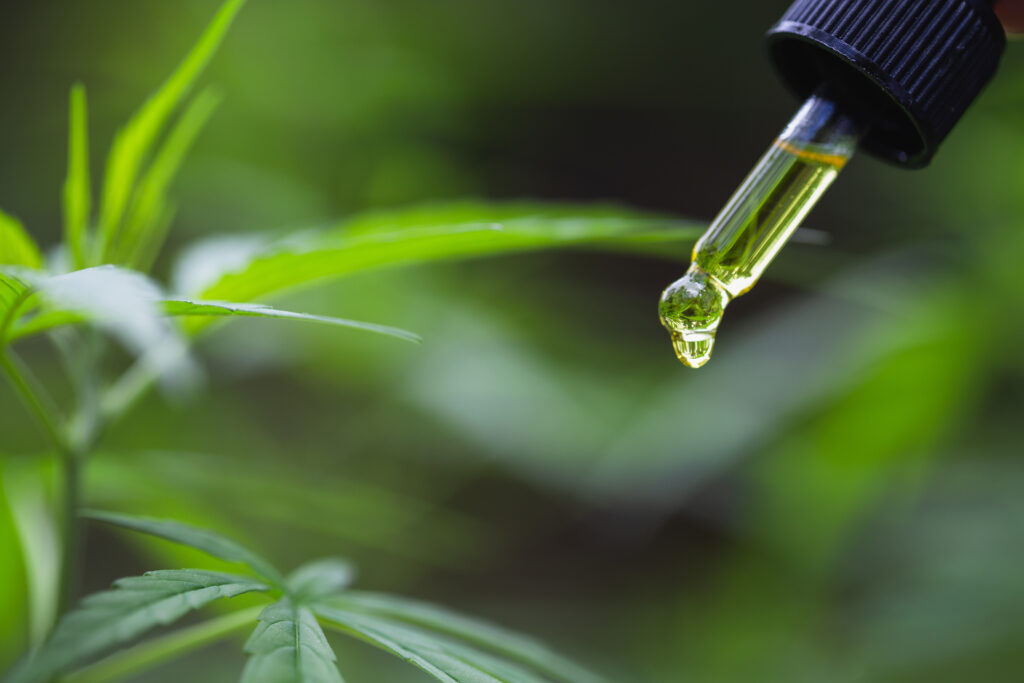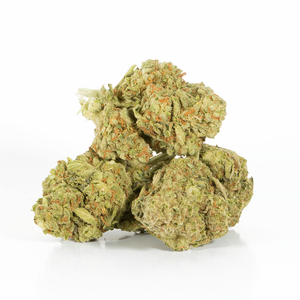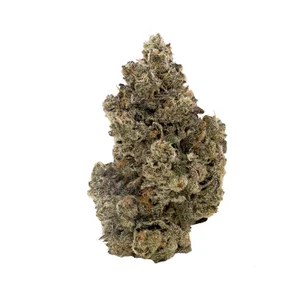With the legalization of marijuana across Canada a few years ago, there’s been a surge of interest in cannabidiol, or CBD for short. You might be wondering, what exactly is CBD? What are the benefits of CBD oil? Is it marijuana? Does it even get you high?
We’ve got your answers right here, so let’s take a look!
What is CBD?
THC and CBD are both chemical compounds found in the cannabis plant, which are known as cannabinoids. THC produces a euphoric effect (a “high”), while CBD does not.
You may have heard the terms “marijuana” and “hemp” and wondered what the difference is. Both “marijuana” and “hemp” refer to the same thing- the cannabis plant. But the big difference lies in their THC content.
Anything containing 0.3% THC or less is considered hemp, whereas typical cannabis strains usually contain at least 10% THC, and some strains can get as high as 30%!
Typically, hemp has higher CBD content than THC, while regular cannabis is the other way around, containing more THC than CBD. Since hemp won’t get you high, it is often used for industrial purposes like making textiles or rope, but increasingly, many products containing CBD have been derived from hemp, as hemp is much cheaper than the weed we smoke to get high.
Given this, many CBD oils are typically made from hemp, giving users the pain relief of marijuana without the psychoactive effects or higher price tag.
However, note that hemp oil and CBD are not the same things. Hemp oil comes from hemp seeds, containing little to no CBD, while CBD oil is made from flower and trim.
Types of CBD Oil
Cannabidiol oil can be broken down into three groups:
- isolate
- broad-spectrum
- full-spectrum
Each type has different traits. While they all contain CBD, some contain less plant fibre and other cannabinoids and terpenes ratios. Which one is right for you will depend on your needs.
Full-Spectrum CBD
Also known as whole-plant CBD, full-spectrum CBD is the least processed option. It may still contain trace amounts of THC (usually less than 0.3%) along with the full profile of beneficial terpenes and cannabinoids found in cannabis.
Full-spectrum CBD oils are sought after because they possess the most substantial entourage effect, which is the idea that using the cannabis plant as a whole increases the health benefits as the full spectrum of compounds work together synergistically.
Broad-Spectrum CBD
Broad-spectrum CBD is similar to full-spectrum in that it contains all the terpenes and cannabinoids of cannabis- except THC.
It offers a solid middle ground where users can still take advantage of the entourage effect (albeit a weaker version since there’s no THC) without worrying about getting high.
Isolate CBD
CBD isolate is the most processed form of CBD oil—everything but the CBD is removed. Some people prefer isolated CBD because it is relatively tasteless compared to full- and broad-spectrum CBD oils.
If they have any taste at all, CBD isolate oils will taste like the carrier oil, which is commonly coconut or MCT oil.
Of course, like broad-spectrum CBD oil, there’s also no THC in CBD isolates either, and since it only contains CBD, you’ll lose out on benefits like the Entourage Effect.
How is CBD Oil Used?
When selecting a CBD product, the first step is to decide what benefits you’re hoping to achieve. Once you know your goal, you can then look into the many options CBD has to offer.
Sublingual
The most common method of using CBD is sublingual administration. This is when CBD oil is held under the tongue for 20-90 seconds. This method is significantly faster than swallowing or eating because it bypasses the digestive system and is absorbed directly into the bloodstream through the capillaries under the tongue.
For those that struggle with anxiety or depression, taking CBD sublingually may be the answer. When a sudden anxiety attack hits, or before one happens, taking CBD sublingually can offer a rapid, calming effect.
Vaping
If inhalation through a vaporizer is more your style, the CBD will be absorbed through your lungs. Inhalation typically allows for a much faster absorption rate thanks to the large surface area of the lungs, which means the effects will kick in much faster than if you swallowed it.
However, keep in mind that not all CBD oil is suitable for vaping, so please pay attention to the labels to make sure you’re getting the right stuff.
Topical
Topical CBD treatments are best for localized pain relief, as they are applied directly to the area that hurts—a targeted approach.
For those living with chronic back pain, CBD massage oil is an excellent option. While the act of the massage itself may help to relax the muscles, tendons, and joints, the oil will also help to soothe the pain long after the massage is over.
Medical professionals believe that CBD reduces many different types of pain because it binds to glycine receptors in the brain. Glycine receptors are responsible for nerve signals between cells. Having the option of manipulating these receptors gives users a unique choice in how they medicate.
Benefits of CBD Oil
Today, the abuse of opioids has become an epidemic, and overdoses have killed thousands. CBD oil presents a safe and cost-effective alternative to more chemically addictive and potentially harmful painkillers that are on the market.
Medical professionals believe CBD effectively does so many tasks because of its interaction with the endocannabinoid system (ECS).
The Endocannabinoid System has wide-reaching effects on the body—so many that researchers don’t even fully understand them all yet.
What we do know is that the ECS plays a significant role in sleep regulation, appetite, mood, memory, immune system function, and reproductive hormone balance.
The extensive list of CBD benefits has led many to view it as the current “miracle” health fad—after all, how can one product do so much? It may seem too good to be true but it’s important to keep in mind that CBD’s rapidly expanding list of potential benefits is due in part to a lack of research. But with cannabis being legalized and embraced by the mainstream, we’re starting to see a flood of studies into many different aspects of cannabis, including CBD.
Now, the stigma against cannabidiol has decreased, and CBD oil and marijuana alike have become a standard in medicine for a wide range of uses. Here are the most common ones:
1. Acne
On top of reducing inflammation, offering intense moisture, and soothing red, irritated skin, studies suggest that CBD oil helps to regulate the body’s creation of sebum. This oily substance protects your skin but also traps dirt that causes acne.
The beauty industry has begun to take notice of the benefits of CBD oil use for skin conditions. If an industry that spares no expense for beauty is taking note of CBD’s benefits for your skin, doesn’t that make you a little curious?
2. Anxiety
Anxiety is a condition that can come and go on a whim, significantly impacting your quality of life. Living with anxiety can create constant stress.
CBD aids in the fight against anxiety via its interaction with the endocannabinoid system. The ECS helps maintain balance in your body, and that balance extends to your body temperature, equilibrium, and mood regulation.
In 2011 a study was conducted to see the impacts of CBD on people with anxiety. Some were given a 400mg oral dosage, others a placebo. Those who had the CBD were shown to have less anxiety.
Anxiety can also affect your performance in bed. More on this in our article on how CBD increases your performance in bed.
3. Epilepsy
Often occurring from a genetic disorder or a traumatic event, the endless cycle of seizures epilepsy causes is a terrifying thing to watch a loved one go through. In recent years, researchers have been chasing possible cures. While they haven’t found one, CBD oil has been shown to ease symptoms.
The most well-known example of what is possible with CBD is the events surrounding Charlotte Figi, a young girl who had developed Dravet syndrome. By age three, Figi suffered debilitating grand mal seizures, nearly 300 a week.
Her parents and physician decided to try CBD. There was a dramatic improvement in her condition in a short amount of time, reducing her seizures to about four a month. The CBD-heavy strain known as Charlotte’s Web was named after her.
4. Chronic Pain
Millions of Canadians live with chronic pain. Whether a migraine, fibromyalgia or a dull headache, CBD oil can help reduce pain and inflammation—again—via the ECS.
Pain relief can be a touchy subject. Many products on the market have long-lasting side-effects or come with the fear of addiction, rendering many people too scared to look for options. CBD isn’t addictive and has no major side effects—if any at all. It’s also affordable and effective.
All the above have made pain relief one of the most common uses of CBD oil.
5. High Blood Pressure
Hypertension or high blood pressure is a condition in which too much force is applied to your artery walls through the blood. It’s affected by both how hard your heart beats and artery health.
We have already established how CBD oil affects anxiety, but it also aids in reducing high blood pressure. Much like reducing anxiety, CBD oil uses its innate ability to modulate the body’s ECS to help regulate mood, reducing stress and anxiety.
That might be enough for some people, but the benefits of CBD oil for heart health don’t stop there. CBD oil also aids in the relaxation of blood vessels to reduce physical stress put on the body.
6. Glaucoma
Glaucoma is often characterized by high eye pressure, but it’s diagnosed based on ocular nerve damage, which can occur without high pressure. It mostly affects the elderly (those over 60), and many believe it to be a genetic condition.
In the 1970s, researchers demonstrated the use of cannabinoids to reduce intraocular pressure by 25-30%. Relieving pressure from the eyes is believed to be a significant factor in slowing or preventing further damage to the optic nerve.
But the science is still out on whether CBD can actually help with glaucoma, and a 2018 study suggested that CBD could even make glaucoma worse.
If you were interested in trying CBD for glaucoma, we suggest that you speak with your eye doctor first and take it slow.
CBD Oil FAQ
What is CBD?
CBD, short for cannabidiol, is a non-psychoactive compound found in the cannabis plant, and it is the second most sought-after cannabinoid other than THC.
Will CBD get me high?
While CBD has many health benefits and interacts with the body in many ways, it doesn’t have psychoactive effects or contains enough THC to produce a high.
Will CBD influence a drug test?
Most drug tests are looking for the compound THC, not CBD. Full-spectrum extract users may test positive due to the trace amounts of THC. However, this would require high dose use, and even then, it’s not very likely.
Does CBD have side effects?
Some users experience mild side effects if taken in high dosages:
- Dry mouth
- Fatigue
- Drowsiness
- Lightheadedness
How much CBD should I take?
CBD dosage will vary depending on your goals, the potency of the CBD product you choose, your ingestion method, metabolism, etc.
Unfortunately, that means there is no standard dosage, and it takes some trial and error to find what works. Your tolerance may also change with continued use. On the upside, you can’t overdose on CBD. Taking too much may result in some minor side effects (mentioned above), but there are no lasting or dangerous risks.
Is it safe to purchase CBD online?
All of our products are from trusted brands that utilize safe production methods and third-party testing. We ship our CBD products via Canada Post in a scent-free, vacuum-sealed bag.
Remember: CBD oil is something you are putting into or on your body—you should only use the highest quality products. That’s what we offer here at XpressGrass. Check out our selection today.
